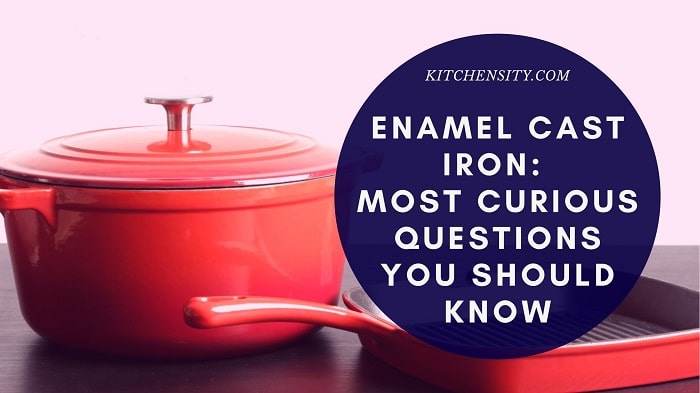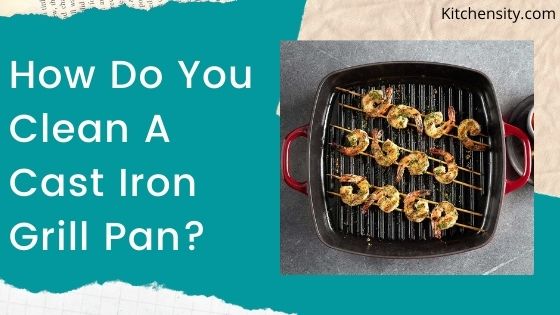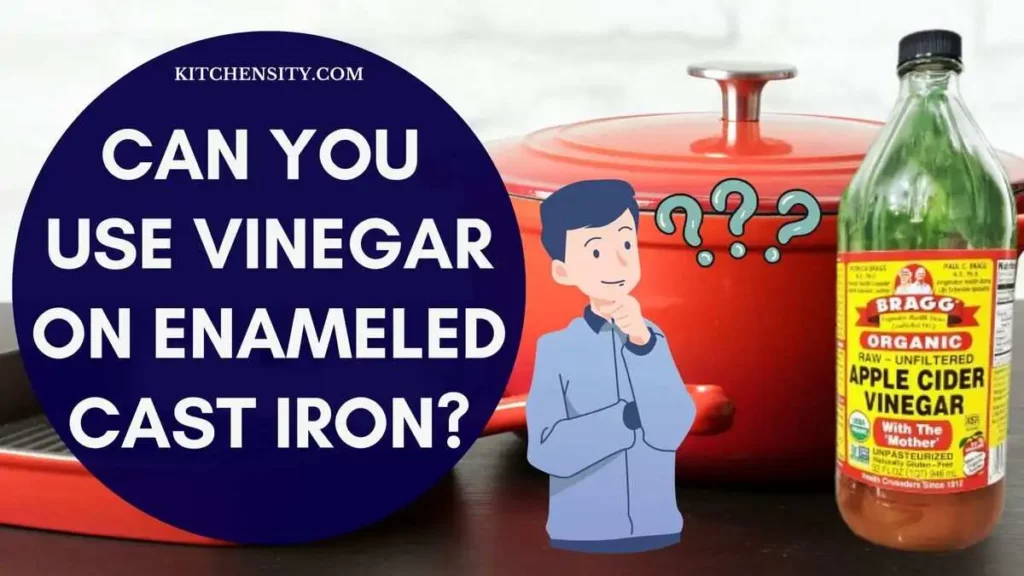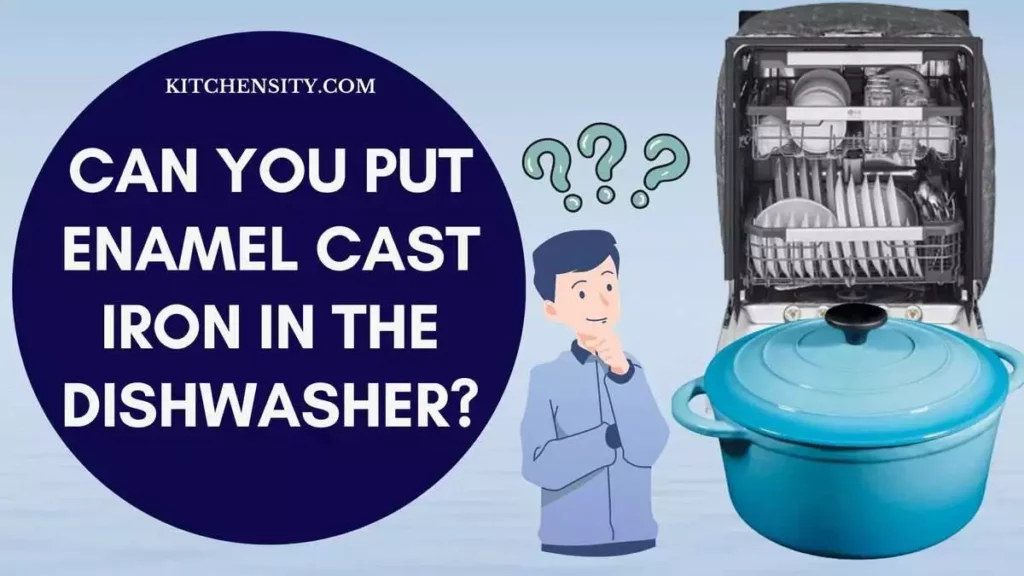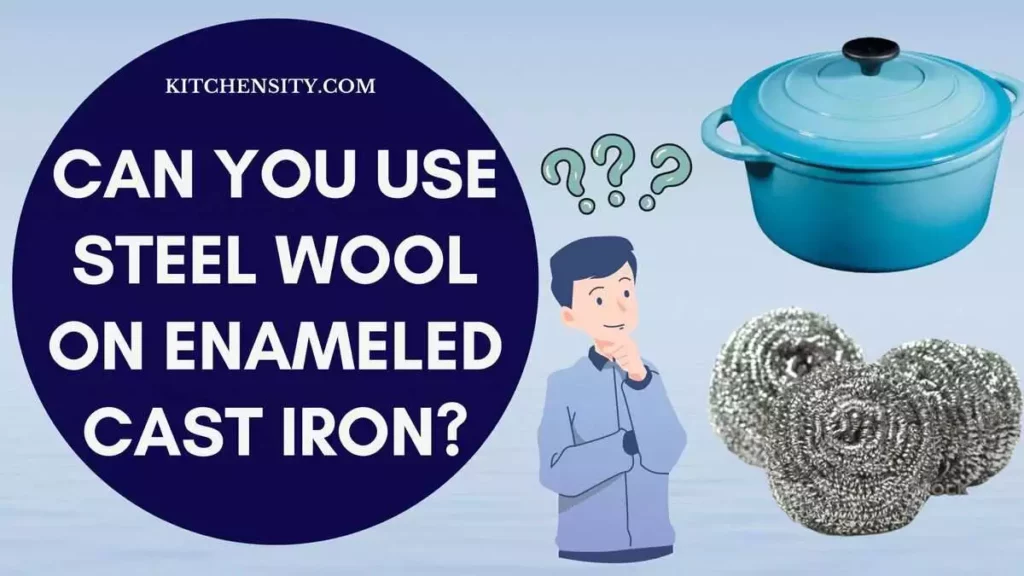Do you find yourself frustrated when your delicious meal sticks to your enamel cast iron cookware? It can be quite disheartening to put in all the effort to cook a meal only to have it stick to the pan and ruin your hard work.
But fear not, as there are several reasons why food might be sticking to your enamel cast iron, and simple solutions to prevent it from happening again. Enamel cast iron cookware is a better version of regular cast iron due to its enamel coating. This coating makes the cookware non-reactive and non-stick which helps us to make items with ease.
Read on to discover the reasons and solutions for food sticking to enamel cast iron cookware.
Table of Contents
- 1 Why Does Food Stick To My Enamel Cast Iron?
- 2 How To Keep Enameled Cast Iron From Sticking?
- 3 Why Does My Dutch Oven Stick?
- 4 How To Make Enameled Cast Iron Non-Stick?
- 5 Why Does Everything Stick To My Enameled Cast Iron Pan?
- 6 Final Verdict: Why Does Food Stick To My Enamel Cast Iron?
- 7 Frequently Asked Questions (FAQ’s)
Why Does Food Stick To My Enamel Cast Iron?
Food sticks to enamel cast iron cookware due to several reasons like high heat, insufficient seasoning, or using metal utensils. Enamel can also chip or crack, exposing the cast iron beneath, and leading to sticking. To prevent sticking, preheat the pan on low heat, use non-metal utensils, and season the pan regularly.
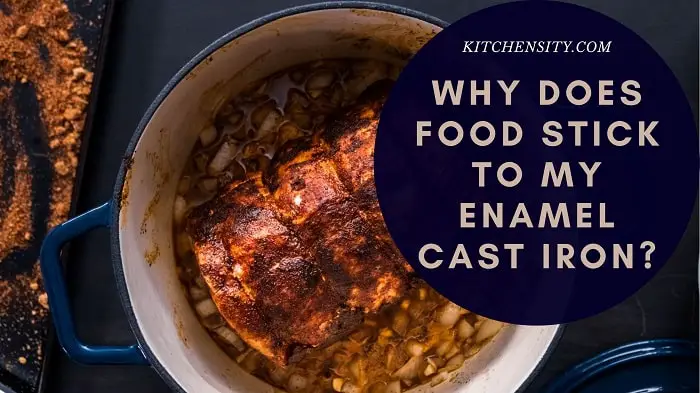
Also Read – Best Enameled Cast Iron Cookware Sets
Here are some reasons why food might stick to enamel cast iron:
- Improper Seasoning: If the enamel cast iron is not properly seasoned, it can lack a non-stick surface, leading to food sticking during cooking.
- High Cooking Temperatures: Cooking at excessively high temperatures can cause food to stick to enamel cast iron, especially if the pan is not adequately preheated.
- Acidic Ingredients: Some acidic ingredients, such as tomatoes or vinegar, can react with the enamel surface, making it more prone to sticking.
- Insufficient Preheating: Not preheating the enamel cast iron pan properly before adding food can result in food sticking to the surface.
- Rapid Temperature Changes: Sudden temperature changes, such as adding cold ingredients to a hot pan, can cause food to stick to the enamel surface.
Many people experience food sticking to enamel cookware because they may not realize that enamel cookware is not inherently nonstick and needs to be seasoned before use for optimal cooking results. While not every instance of cooking will result in food sticking to the cookware, it is a common occurrence in many cases.
In the case of the Dutch Oven, it heats up more rapidly, causing the interior temperature to rise significantly if the heat is consistently applied. This rapid and high heat is a primary factor contributing to food burning and sticking to the pot.
Also Read – Does Enamel Cast Iron Chip?
How To Keep Enameled Cast Iron From Sticking?
The best way to avoid food sticking to your enamel cast iron cookware is to season it. Along with seasoning, you have to maintain proper heat and be selective in choosing the food items.
Enamel cast iron cookware is perfect for searing meat or fish, cooking veggies, making pasta or noodles, etc but not for making perfect omelets. No matter how good your cookware is, omelets will always be perfect in a nonstick skillet.
To keep enameled cast iron from sticking, you can follow these tips:
- Proper Seasoning: While enamel cast iron doesn’t require seasoning like traditional cast iron, it can benefit from a light coating of oil before use to enhance its non-stick properties.
- Preheat the Pan: Ensure the pan is properly preheated before adding food. This allows the surface to reach an even temperature and reduces the likelihood of food sticking.
- Use Medium Heat: Avoid cooking at excessively high temperatures, as this can cause food to stick. Instead, opt for medium heat settings for most cooking tasks.
- Avoid Sudden Temperature Changes: Try to avoid sudden temperature changes, such as adding cold ingredients to a hot pan, as this can cause food to stick.
- Use the Right Utensils: Use wooden or silicone utensils to avoid scratching the enamel surface, which can make it more prone to sticking.
- Clean Carefully: After cooking, allow the pan to cool slightly before cleaning. Use a gentle sponge or cloth to avoid damaging the enamel surface.
- Regular Maintenance: Keep your enamel cast iron in good condition by regularly cleaning and maintaining it. This includes avoiding harsh cleaners and abrasive scrubbers.
1. By Seasoning
Seasoning cookware will help you to achieve a much smoother surface. When the oil is heated at high heat, it polymerizes with the pan means it fills the pores of the cookware and makes the cookware smooth.
Most people think seasoning is a difficult process, but no it’s very easy to do so. It only requires 30 to 45 minutes for the complete process. If you don’t know about seasoning, then this guide on how to season an enamel cast iron cookware will help you.
Only seasoning the enamel cookware will not be enough to avoid the food sticking. It will lower your chances, but if you do not follow the other instructions, then next time the food may stuck when you cook.
Also Read – Do You Need To Season Enameled Cast Iron?
2. Types Of Food
Certain types of food items may stick to your enamel cast iron cookware. Yes, this cookware is designed to cook any items but it is always better not to cook the items that may stick to your cookware.
Some items like:
- High protein but low in fat (you have to use a little oil to cook these items).
- Sugary Sauces
- Tomatoes
- Honey, Wine, Garlic, etc.
- Omelet
There are more but these food items are especially very prone to stickiness. It doesn’t mean that you can’t cook these items. You can cook but you have to use a little bit of oil or butter and had to maintain proper temperature.
Also Read – Pros And Cons Of Using Olive Oil To Season Cast Iron Pans
3. Maintaining Temperature
Maintaining the heat is very important while cooking because if you are not careful, then it may burn your food and the food will be stuck to your cookware. When you cook in an enamel cast iron Dutch oven, the interior becomes very hot after some time due to its high walls and even heating. So, try to adjust the temperature whenever necessary to avoid food burning and sticking.
If you are cooking on a stove, cook at a higher temperature first, then slowly adjust it to medium to low temperature.
4. Cleaning The Cookware
Only seasoning, selecting the food items, and adjusting the temperature will not be enough to maintain your enamel cast iron cookware. Once you cook, you have to properly clean and care for your pots and pans to maintain them.
Don’t rinse the pan directly after cooking as it will ruin the surface of the cookware. After cooking, let it cool down and then you start cleaning it. For cleaning, don’t use any abrasive materials. Always use a soft sponge and a dishwashing liquid to clean your cookware. After cleaning, wipe it with a cloth or a paper towel to dry it completely before storing it.
These small tips are lifesavers to protect your pan from getting ruined. If you maintain your enamel cookware like this, then it will last you for decades.
Also Read – Can You Use Enameled Cast Iron On A Glass Cooktop?
some Additional tips to keep food from sticking
- Preheat The Pan: Allow your enameled cast iron cookware to preheat on medium heat for a few minutes before adding any food. This will help to create a non-stick surface.
- Use Enough Fat: Adding enough oil or butter to the pan before cooking will help to prevent food from sticking. You can also use cooking spray, but be sure to read the label to ensure it is suitable for use with enamel.
- Avoid High Heat: Avoid using high heat when cooking with enameled cast iron cookware. High heat can cause the enamel to crack and can also cause food to stick.
- Wait For The Pan To Cool: After cooking, allow your enameled cast iron cookware to cool completely before cleaning. This will prevent the enamel from cracking and will make it easier to clean.
- Use A Gentle Scrubber: Use a gentle scrubber, such as a soft sponge or brush, to clean your enameled cast iron cookware. Avoid using harsh or abrasive cleaners, as these can scratch the enamel and cause it to lose its non-stick properties.
By following these tips, you can help keep your enameled cast iron cookware in great condition and prevent food from sticking.
Also Read – Can You Put Enameled Cast Iron In The Oven?
Why Does My Dutch Oven Stick?
Your Dutch oven may stick for several reasons. One common cause is inadequate preheating, which can lead to uneven cooking and food sticking to the surface. Another reason could be cooking at excessively high temperatures, which can cause food to burn and adhere to the pot. Also, using the wrong type of utensils or not seasoning the Dutch oven properly can contribute to sticking.
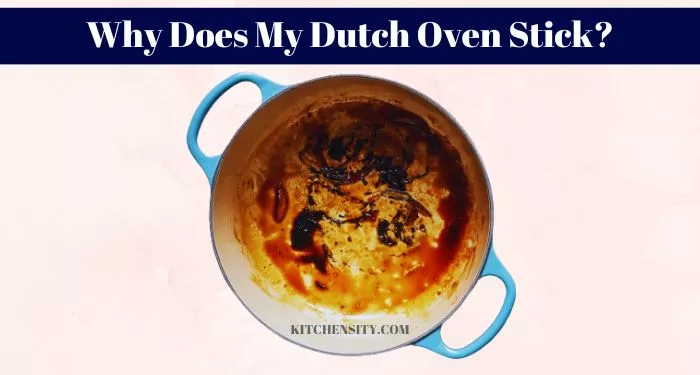
Some of the reasons why your Dutch oven sticks:
- Not Properly Seasoned: If your Dutch oven is not properly seasoned, food can stick to the surface. Seasoning is the process of applying a layer of oil to the surface of the Dutch oven to create a non-stick surface. If you have not seasoned your Dutch oven or if the seasoning has worn off, you may experience sticking.
- High Heat: If you cook at too high of a temperature, food can stick to the Dutch oven. This is because the high heat can cause the food to burn and stick to the surface.
- Not Preheating The Dutch Oven: It is important to preheat the Dutch oven before adding food. If you add food to a cold Dutch oven, the food can stick to the surface.
- Using The Wrong Cooking Utensils: If you use metal utensils on your enameled cast iron Dutch oven, they can scratch the surface and cause food to stick.
- Acidic Foods: Acidic foods, such as tomatoes and citrus, can react with the enamel coating of the Dutch oven and cause it to stick.
To prevent sticking, it is important to properly season your Dutch oven, cook at a moderate temperature, preheat the Dutch oven before adding food, use the proper cooking utensils, and be cautious when cooking acidic foods.
Also Read – Can You Use Steel Wool On Enameled Cast Iron?
How To Make Enameled Cast Iron Non-Stick?
To make enameled cast iron non-stick, start by seasoning it with a thin layer of oil to enhance its natural non-stick properties. Preheat the cookware before adding ingredients, using low to medium heat to avoid sticking. Use wooden or silicone utensils to prevent scratching the enamel surface, and clean the cookware gently after each use to maintain its non-stick qualities.
While enamel cast iron cookware is not inherently non-stick, there are some steps you can take to make it more resistant to food sticking:
- Season The Cookware: Just like with traditional cast iron cookware, seasoning can help create a natural non-stick surface on your enamel cast iron. To season, coat the inside of the cookware with a thin layer of oil and heat in the oven at 350°F for an hour. Let cool and wipe away any excess oil.
- Preheat The Cookware: Make sure your enamel cast iron cookware is fully preheated before adding food. This helps to create a natural non-stick surface by allowing the cookware to expand and the pores to open up, reducing the likelihood of food sticking.
- Use Oil Or Butter: Adding a small amount of oil or butter to your cookware before adding food can help to create a non-stick surface. Use just enough to coat the bottom of the pan and prevent sticking.
- Use The Right Utensils: Avoid using metal utensils or abrasive sponges on your enamel cast iron cookware, as they can scratch the surface and damage the enamel. Instead, use wooden or silicone utensils that are gentle on the surface.
- Cook At The Right Temperature: Cooking at a lower temperature can help prevent food from sticking to your enamel cast iron cookware. High heat can cause the enamel to become damaged and can make food more likely to stick.
By following these steps, you can help to make your enamel cast iron cookware more non-stick and prevent food from sticking.
Also Read – Can You Put Enamel Cast Iron In The Dishwasher?
Why Does Everything Stick To My Enameled Cast Iron Pan?
Several factors can cause everything to stick to your enameled cast iron pan:
- Improper Preheating: If the pan is not adequately preheated before adding food, the uneven heat distribution can lead to sticking.
- High Cooking Temperatures: Cooking at excessively high temperatures can cause food to burn and adhere to the pan’s surface, making it difficult to remove.
- Acidic Ingredients: Some acidic ingredients, like tomatoes or vinegar, can react with the enamel, leading to a rougher surface that is more prone to sticking.
- Not Using Enough Oil or Fat: Insufficient oil or fat in the cooking process can result in food sticking to the pan.
- Rough Handling or Cleaning: Using abrasive cleaning tools or harsh cleaners can damage the enamel surface, making it more susceptible to sticking.
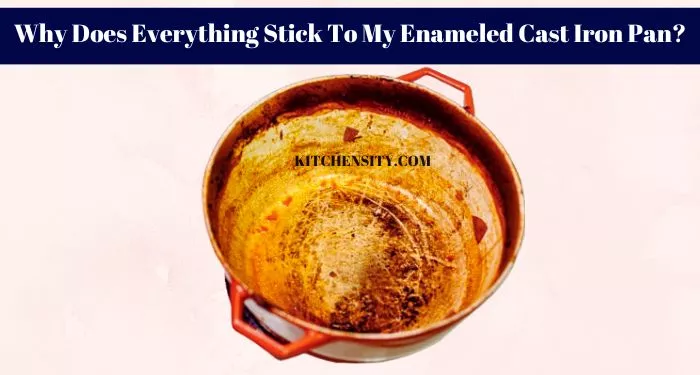
To prevent sticking, ensure proper preheating, use moderate cooking temperatures, avoid acidic ingredients if possible, use enough oil or fat, and handle and clean the pan gently.
Also Read – Why Is Cast Iron Pan Sticky After Seasoning?
How Do I Keep My Le Creuset From Sticking?
To keep your Le Creuset cookware from sticking, it’s important to preheat it properly on low to medium heat before adding ingredients. Use a thin layer of oil or fat to create a non-stick surface, and avoid cooking at excessively high temperatures. Additionally, use wooden or silicone utensils to prevent scratching the enamel coating, and clean the cookware gently after each use.
To keep your Le Creuset cookware from sticking, follow these tips:
- Proper Preheating: Preheat your cookware on low to medium heat for a few minutes before adding ingredients. This ensures even heat distribution and reduces the chances of sticking.
- Use the Right Amount of Oil or Fat: Apply a thin layer of oil or fat to the cooking surface before adding ingredients. This helps create a barrier between the food and the pan, reducing sticking.
- Avoid High Heat: Le Creuset cookware retains heat well, so you can often cook on lower heat settings than you might with other cookware. Avoid using excessively high heat, as this can lead to sticking and burning.
- Use Wooden or Silicone Utensils: To prevent scratching the enamel coating, use wooden or silicone utensils instead of metal ones.
- Clean Carefully: After cooking, allow the cookware to cool slightly before cleaning. Use a gentle sponge or cloth to avoid damaging the enamel surface.
Also Read – How To Clean A Cast Iron Grill Pan?
My Le Creuset Non-Stick Not Working: What To Do?
If your Le Creuset cookware is not performing as a non-stick surface, you can try the following steps:
- Re-season the Surface: Clean the cookware thoroughly and then apply a thin layer of oil to the interior surface. Heat the cookware in the oven at a low temperature for about an hour to re-season the surface.
- Adjust Cooking Temperatures: Ensure you’re not using excessively high heat, as this can cause food to stick. Try cooking at lower temperatures to see if it improves the non-stick performance.
- Use More Oil or Fat: Increase the amount of oil or fat you use when cooking to create a better non-stick surface.
- Check for Damage: Inspect the cookware for any damage to the enamel coating. If you notice any chips or scratches, it may be time to replace the cookware, as these can affect its non-stick properties.
- Contact Le Creuset: If none of the above steps work, consider contacting Le Creuset customer service for further assistance or to inquire about any warranty coverage.
Also Read – Le Creuset Enamel Worn Off! Learn To Re-Enamel It
Final Verdict: Why Does Food Stick To My Enamel Cast Iron?
Food sticks to your enamel cast iron when you are not using sufficient oil and supply excessive heat. Some food items, not much care, and maintenance are also responsible for this stickiness. If not maintained properly, the sticky residue builds up over time, and cooking in your enameled cast iron becomes difficult
If you want to avoid food sticking to your enamel cast iron cookware, then follow these tips:
- Season the cookware before use. If you are feeling lazy, then heat the pan, pour some oil, and when the oil is heated start cooking.
- Use a wooden or silicone spatula or accessories to avoid removing the enamel coating.
- When you are cooking high-protein food like beef, chicken, egg, etc try to use some extra oil to avoid sticking.
- After cooking, let the cookware cool down, clean it properly with a soft sponge and a dishwasher liquid, and completely dry it before storing.
If you follow all these tips, your cookware will last forever and you will always feel like new cookware.
Also Read – Is Enameled Cast Iron Cookware Safe?
Frequently Asked Questions (FAQ’s)
Why Is My Enamel Cast Iron Sticking?
Your enamel cast iron may be sticking due to inadequate seasoning or preheating. Using high cooking temperatures can also cause food to stick to the enamel surface. Additionally, sudden temperature changes or using metal utensils can contribute to sticking.
Is Enameled Cast Iron Non-Stick?
Enameled cast iron is not inherently non-stick like traditional seasoned cast iron, but it can exhibit some non-stick properties when used and cared for properly.
Does Enameled Cast Iron Need To Be Seasoned?
Enameled cast iron does not require seasoning in the same way as traditional cast iron, as the enamel coating provides a protective layer. However, a light coating of oil can be used to enhance its non-stick properties.
Why Is My Staub Pan Sticking?
Your Staub pan may be sticking for a few reasons. First, it may not have been seasoned properly. Additionally, if the pan is not heated properly or if the heat is too high, food can stick to the surface. It could also be due to the type of food you’re cooking or the cooking technique you’re using
Why Is My Le Creuset Sticking?
Your Le Creuset may be sticking for similar reasons as your Staub pan, such as improper seasoning, cooking at too high a heat, or using the wrong cooking technique. It could also be due to the type of food you’re cooking. Also, if the enamel coating is chipped or damaged, it can cause sticking.
Katrina Smith is a seasoned expert with over 25 years of experience in all things related to cooking and the kitchen. As an avid cook and kitchen enthusiast, she is passionate about sharing her knowledge and expertise on cookware, kitchen appliances, kitchen tips, and kitchen staples.
Through her articles and reviews, Katrina aims to inspire and help others improve their cooking skills, experiment with different ingredients, and invest in quality cookware and appliances.

![How To Season And Clean Cast Iron Cookware? [4 Effective Ways] 5 How To Season And Clean Cast Iron Cookware](https://www.kitchensity.com/wp-content/uploads/2020/06/How-To-Season-And-Clean-Cast-Iron-Cookware.jpg)
